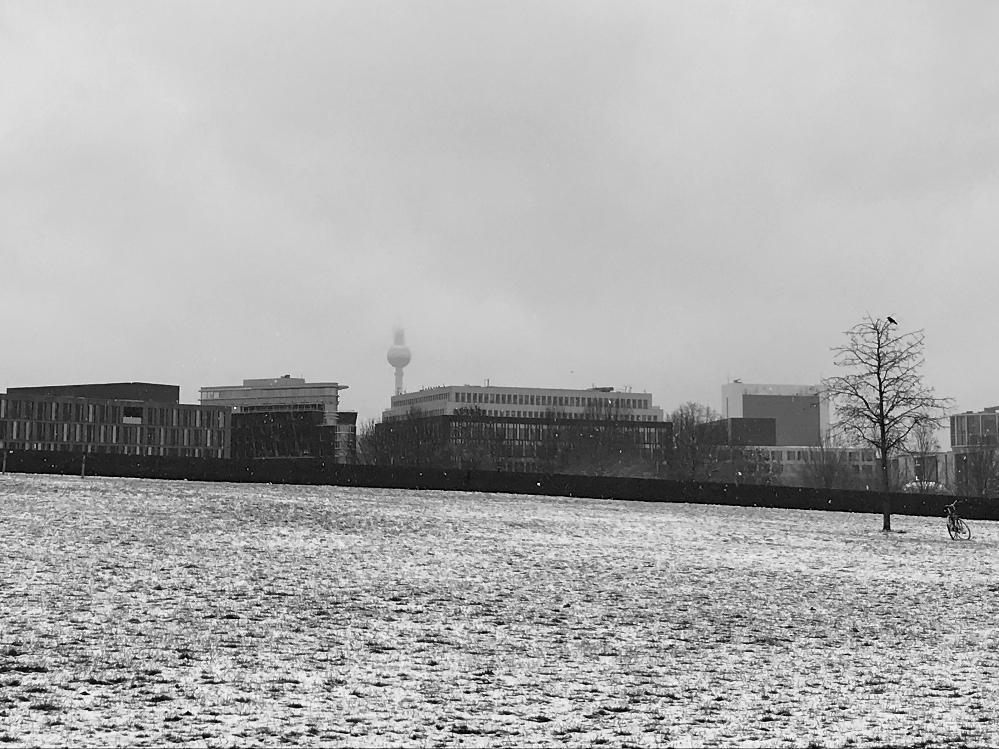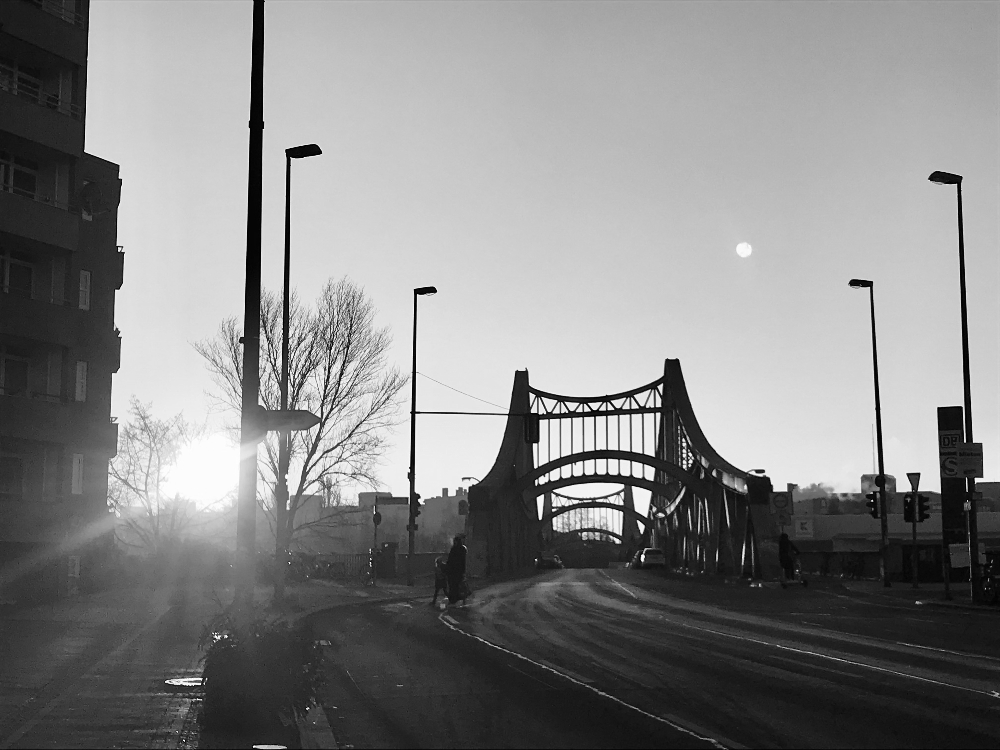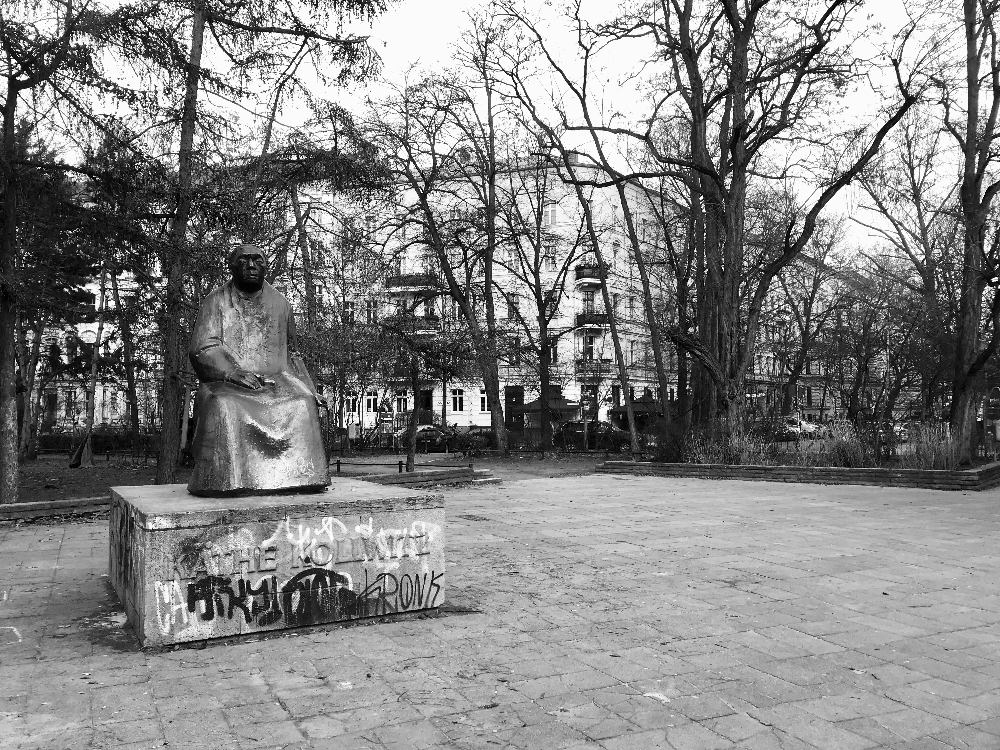
The S-Bahn is empty mid-morning. The streets are piled high with the debris of an explosive night before. It’s a day where even the weather seems to be having a lie-in. It is not yet time, it seems, for the new year to begin.
Perhaps the city is waiting for the countdown. At the Brandenburg Gate we pin the year to our chests and line up behind “pacers” whose job it is to slow us down and who have – we are told through a crackly speaker system – have an average age of 81. The countdown commences and then we run; down Unter den Linden, past the Russian Embassy and the vigil outside for those killed in Ukraine. At Bebelplatz they are dismantling the Christmas Market but ahead of us, in front of the City Hall, the big wheel turns still.
‘Wir schaffen das!’
The mum encourages her daughter at the halfway point. Dad echoes the sentiment, but it is easy for him to say as he tolls along on a bicycle. The runners are stretched out now, from the Museum Island to the Brandenburg Gate and the finish line. As we arrive the weather finally wakes up. It begins to rain. The new year can finally begin.
*
In Pankow the drizzle has set in. Only dog walkers and joggers are braving the early year conditions, but the lights are on at the beer garden in the park so we walk over more in hope than expectation.
‘I had some things to do so I thought I’d open the hatch and see who turned up…’
The man is cheerful as he warms our apple punch and Glühwein. It seems likely that we might be his only business of the day. But then again – with his strung-out lights shing against the dull, deadened colours of a Berlin winter’s day – you never know.
*
The first election posters for the rerun vote are spotted. Free Palestine is scrawled on a wall. A Ukraine flag hangs limply from a balcony. Its colours are faded by the sunshine of two summers. We are approaching the second anniversary of the Russian invasion.
*
Reading Train Dreams by Denis Johnson. A “whole life” story of changing times in the American West and a short novel that manages to tell a story of epic scale in its 116 pages. It would make a good companion to A Whole Life by Robert Seethaler in its depiction of an individual experiencing the world shifting during a self-contained lifetime, even if the books themselves are as different as an American railyard is to an Alpine valley.
God needs the hermit in the woods as much as He needs the man in the pulpit. Did you ever think about that?
They are books about lives on the borderland. That ragged space where nature meets what we call civilisation, and the recognition that here there is no line at all; that one is part of the other, and the idea that we can hold nature at arms length – from the safety of our “civilisation” – is as illusory as the dreams that haunt us like memories in the night.
*
Behind the Soviet War Memorial in Tiergarten, sleet falls between the photos that show Berlin in 1945. The brick skeletons of the buildings. Tiny figures picking their way through the rubble. The Tiergarten completely devoid of trees.
We walk on through the park, where every tree and bush is younger than those photographs, with the knowledge that if they can be stripped away once, they can be stripped away again.

Outside Wittenberge in Brandenburg, the Elbe has broken its banks and flooded fields on either side of the motorway. South of Berlin, wind turbines stand in a foot of water. The mildness of the past few weeks is about to give way to a freeze, and the waters will not recede in time. The frost won’t be able to break up the soil, and the fields will not be able to absorb as much water in springtime. This will be bad for the crops.
Meanwhile the farmers are blocking the roads and making their feelings known, taking headlines from Sahra Wagenknecht, who launches a party named after herself. Ukraine. Gaza. The climate crisis. Recession. A Deutsche Welle survey finds that only half of respondents in Germany are confident that 2024 will be a good year. Meanwhile, the AfD are polling at 22%
I cannot avoid the impression, Vaclav Havel wrote in 1984, that many people in the West still understand little about what is actually at stake in our time.
Overnight, the temperature drops. We walk along frozen tracks between waterlogged fields in the mist, before it is time to make our way back to the city.
*
The closest thing we have to a daily walk takes us along Bellermannstraße to the Millionenbrücke, crossing the tracks to Swinemünder Straße and on to where Gesundbrunnen gives way to Mitte by crossing the little line of cobblestones that mark the route of the Berlin Wall. For seven years we lived at one end of Swinemünder Straße, close to Arkonaplatz. For the last thirteen we have lived at the other.
Many of the stories of this walk are personal. A first kiss. A first bike ride. Helping a friend move apartments. A marathon viewing of Buffy the Vampire Slayer and summer beers by the riverbank. Sunday runs and walks to work. Flea markets and meeting friends at the playground, some of whom have left Berlin, others who have passed away.
Later I am with a group of people as we cross Swinemünder Straße. We are following the route of the Berlin Wall now, and our group contains people from Australia, Romania, Japan, Cameroon, the Netherlands and Germany. None of them were even born when the Wall was standing, and they have come to hear stories from the divided city and beyond. On Bernauer Straße, some of the gaps created by the fortifications have yet to be filled in, even though this has been a memorial site longer than it was a no-man’s land.
The group are interested in the stories of the Wall and the city at a time that is increasingly hard to imagine. But they are also interested in the personal stories of a place. Of those first kisses and a child learning to ride their bike. Stay long enough in a place and your own memories become stories of the city, to be taken away by those who visit, shaping their own ideas of what Berlin is and how it once was, at a time when they were children in places far away.

Secret meetings in a villa outside Potsdam. The discussion is about “Remigration” – meaning: mass deportations.
With under two years till the general elections, Musa Okwonga writes, it’s time that a lot more people started paying attention.
*
A run along the river crosses the old border into Pankow. The lights are shining once more at the beer garden, but it is not the time to stop. On the edge of the park, close to where the trams rubble by, the memorial to the Czechoslovak journalist, communist and member of the anti-Nazi resistance Julius Fučík stands solid beside the footpath.
MENSCHEN, ICH HATTE EUCH LIEB. SEID WACHSAM!
Be vigilant. Fučík worked for the underground Communist Party after the Nazi occupation of Czechoslovakia, moving between his parents’ house and other locations in the countryside before finally being captured by the Gestapo in 1942. In 1943 he was brought to Berlin, charged with high treason, and executed at Plötzensee prison, not far from our apartment and close to the lake where we sometimes go swimming in the summer.
*
A friend travels in from Brandenburg and we walk together to Pariser Platz.
NIE WIEDER IST JETZT!
The demo was called in a hurry. Many of the placards are homemade. The crowd is mixed in age. There are 25,000 here in Berlin and another 10,000 in Potsdam. Is it enough?
In an interview for NDR, the writer Florian Schroeder talks about the role of the Identitarian Movement – whose ideologue Martin Sellner was present at a meeting in Potsdam with members of the AfD – within the populist right as a whole. They operate, Schroeder argues, in a “pre-political space”, changing the terms of reference. From deportation, for example, to remigration…
This is a classic populist tactic. Someone from the fringe says the “unsayable”. Everything shifts in response, including the discussion of the so-called “middle”.
It’s wrong to say that history repeats itself. Each time and era has its own unique set of circumstances and challenges. But even if the context shifts, as in the quote so often attributed to Mark Twain, history may not repeat itself – but it does rhyme.
The only thing we learn from history is that we learn nothing from history, wrote Hegel, but we know that this is also not true. People learn from history all the time. But those doing the learning might not always be on our side…

As the tractor horns sound outside, four thousand Faroese fans (approximately 8% of the entire population) belt out the national anthem before a European Championship handball match against Poland. The game is played in a cacophony of boos and whistles, shouts and cheers, mostly on the side of the tiny island nation from the North Atlantic. The game is cagey and tense, with no side getting more than two goals ahead at any time.
While the athletes and the fans give their all, an announcer called Kevin does his best to get the rest of us going. In between plays and bursts of Europop, John Denver and Neil Diamond, Kevin tells us what is going on in a beautiful Euro-English accent that has its origin somewhere near a service station close to the French-German-Luxembourg border. Naturally, whether the players are Faroese or Polish – or later Norwegian or Slovenian – he pronounces each and every one of their names with precision, from Elias Ellefsen á Skipagøtu to Przemysław Urbaniak.
Poland wins but both teams go out. The Faroe Island fans retire to the bar to drown their sorrows, but most return to their seats to watch Norway and Slovenia battle it out for the group win. The latter win the tightest of victories, before we all head out into a dark, cold night, that echoes with the sound of the Faroese songs and those tractor horns, all soon to be muffled by the thinnest of blankets of overnight snow.
*
In the city, snow and ice brings chaos wherever it meets stone or concrete. A walk to the shops becomes a dangerous undertaking with the threat of injury. Bridges become ice rinks, with nothing solid beneath them, only freezing air. The snow piles up by the kerb, dirty orange and speckled with grit.
In Brandenburg and Sachsen-Anhalt, the effect is no doubt the same in the towns and cities, but moving between them and something about the snow creates a shift of perspective. Here, it serves to muffle and disguise, hide and cover. A village, viewed across a white blanketed field beside a fairytale forest, is a collection of neat white triangles around a church tower, the snow resting on slates, plastic tiles or solar panels, covering plastic toy and garden furniture, water butts and gas tanks.
Under a grey sky, with everything else seemingly black and white, the scene becomes impossible to date. Viewed through a car window it is as if we are taken out of the here and now, if only for a moment.
It’s a little uncanny. Or perhaps, as an old Aimee Mann song gives way to the hourly news bulletin, it is just a short moment of wishful thinking.
*
A short walk to the Elbe in Wittenberg, with snow on the cobblestones of the old river harbour, where some brick factories are still operating, others have been turned into gyms and training colleges, furniture showrooms and DIY stores and others still have been left to collapse into snow-dusted ruins.
Scrawled slogans insult others for slights the casual reader can never possibly know. A swastika against the red brick triggers an almost physical reaction. You try to imagine the person as they spray it. What are they thinking? What are they trying to say?
At the river, the sounds and the symbols of the city, its past and its present, recede. Geese fly in formation overhead. Deer stand in the field on the opposite bank, dark against the snow. Dogs bark in a distant village. Church bells sing. And the river rushes on by, no time to pause in its long journey from the Bohemian hills to the North Sea.

The numbers offer a glimmer of hope. Organisers say 350,000. The police say 100,000. No matter the demo, no matter the country, it’s always the same. But if the truth lies somewhere in the middle, it remains – as do all the demos across the country – a powerful symbol. As does the vote on dual citizenship laws in the Bundestag.
Ignoring the protests against them, the AfD put “Dexit” on the table. Meanwhile, train drivers announce a six-day strike. Recession grows ever more likely. And the temperature rises by ten degrees and the snow melts.
*
News from Liverpool reaches the Berlin U-Bahn. Football is unimportant, especially when compared to what is happening in the world, and yet it is the sense of escape that it gives that keeps us following and tuning in, despite the money, the corruption and the sportswashing that are an inescapable part of the sport. As for Jürgen Klopp: for anyone who fell in love with footy as a kid, you’ll understand how Liverpool fans are feeling. He made us feel like it was then… again.
*
Escape on a Friday night is to be found at the Velodrom, just off Landsberger Allee. Groups of young people gather inside the track, clutching their plastic glasses of beer. Lights flash and music blares. The two commentators do their best to explain what is going on to those of us for whom the Berlin Six-Day races are the only indoor cycling event they ever go to watch. Older men, slim in their jeans with a cycling cap perched on their heads follow the events on the track. They don’t need any explanations.
The Six-Day Races have been going for more than a hundred years, although the pandemic shut the Berlin edition down for a while and now the racing only takes place over two days.
“We’re working on it…’ one of the commentators says, about the possibility of returning the event to its former glory. Those who have come to the Velodrom on this cold, January Friday evening seem to be having a lot of fun. The racing will continue to midnight, in a dizzying array of disciplines. Not everyone – audience or competitor – will make it to the end.

A slow morning stroll through streets I have known for more than two decades. A cafe where we drank 2.50 DM beers while the proprietor told inappropriate jokes about 9/11. A square where we met friends in the playground when our children were still small enough to go on the swings and climbing frames. The house where an old, mostly lost friend lived, surrounded by walls that we helped to paint. Her name is still on the doorbell.
More squares, more playgrounds. Which shops are the same? Which cafes have changed their name? By the Gethsemanekirche – where the Peaceful Revolution first arrived in Berlin – notices on the railings bring to the attention of the neighbourhood human rights abuses at different places around the world. Another message kindly asks the person who keeps tearing the notices down to come and talk instead. A time and a place is offered.
Let us talk! But this is a time for slogans. Shouted by a multitude. Affixed to the front of a tractor. Delivered while glued to the floor or aiming foodstuff at a piece of artwork.
*
A sign above a kindergarten exclaims:
NEVER AGAIN WAR
A painted piece of cardboard leaning against a balcony balustrade insists:
NEVER AGAIN IS NOW
The sun shines. The air is chill. In the centre of the square, an old artist contemplates an empty playground in the place where she used to live and which now carries her name.
NIE WIEDER KRIEG
Käthe Kollwitz’s placard is a hundred years old this summer, created to mark the tenth anniversary of a war that was supposed to end all wars and took with it 40 million souls, including Kollwitz’s son Peter, who died on the battlefield in October 1914.
A hundred years. Never again… No more wars. But you count them off, and there are so many in the century that has passed. Even then, you realise, do not know of them all.
Don’t forget Sudan.
The sticker on the lamppost is small. For “Never again” to mean anything, it requires the memory of what went before. But instead we do our best to forget what is happening, even as it happens.

Words & Pictures: Paul Scraton
